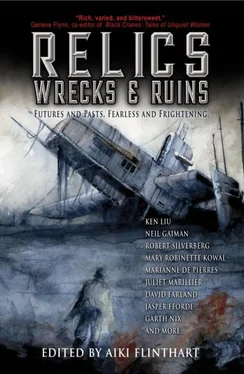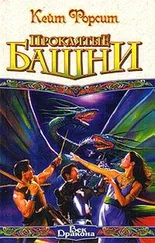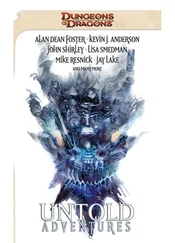The door buckles. Another hit and it skews sideways, ragged lock left hanging. The insects outside see us through the gap. They grow agitated. Claws rake at the opening, wings clatter and batter like panels of fragile plastic against the door pillar.
“Hold steady,” whispers Dinuth.
I can almost taste his fear—it has the same flavour as my own. Beside me, Soleil shifts and gulps. She has never fought anyone while in human form. But her jaw hardens and her grip on the weapon is steady.
The door falls inwards and the mutants heave forward. Black carapaces glint in the light and razor claws scrabble across the panelled metal floor. The room fills with their inhuman voices and the stench of their carrion-laced breaths.
Dinuth moves first. His blaster sizzles a bolt of energy into the foremost insectoid. It falls into a pile of smoking ash. The others crawl over it—uncaring. Dinuth fires again, but this time the blaster fails, the old tech ruined by neglect.
I step into the breach. The shotgun roars and more mutants fall, their gore splattering the floor. But it’s not enough. Soleil dances into the fight, light-footed and quick. Wielding the xiphos in one hand, she carves it into the wall of thick, brittle chitin. The blade glimmers, an arc of polished steel. Wing fragments fly, floating like pearlescent glitter. Black blood follows, splattering her face and the wall and the floor.
Dinuth uses the blaster like a club. A mutant ducks past his defenses and plunges its razor-tipped claws through a gap in his armor. Between the hip and the abdomen. Dinuth grunts and punches the creature in the face. It falls backwards, and so does he.
Overwhelmed by the numbers, I fire round after round. The chamber clicks empty. My last nine rounds are loaded. My empty ammo belt feels too light for comfort. I shoot again.
The gun jams.
“Shit, not again,” I snarl, working to clear the breach. It frees. I snap the gun back to my shoulder and squeeze the trigger. The recoil is a bitch when this time it fires.
Bodies pile up against the opening. One shot. Two. More shots. Then nothing moves in the doorway. It’s blocked. The other mutants can’t get through. I glance down. Still got two bullets left.
Soleil, splattered with black blood and xiphos in hand, stands breathless by the door.
“Is he okay?” she asks, eyes on Dinuth.
I kneel by the buru. His hand flutters by his belt. The vial. But it lies shattered at his side, purple liquid scattered across the ground.
His fingers touch the fluid and his breath catches. His eyes close. “It’s gone,” he says. “Everything I worked for. Lost. The buru have won.”
But I’m not willing to let these goddamned aliens win.
“Not yet they haven’t.” I tear a strip of fabric from the hem of my shirt and plug his wound. “Here hold this,” I say.
Dinuth presses his palm to the wad. “What are you doing?”
“Getting us the hell out of here.”
“But the formula is gone.”
I lean in close to his face. “But you aren’t. You created it before and you can do it again. And maybe, just maybe, you can perfect it with the help of me and Soleil. Maybe our DNA is the answer. One was mutated, one not. That’s what you need, isn’t it? A comparison?”
Dinuth’s eyes widen.
“Now, I’m going to get us all out of here,” I say. “We get the kids and we set up a new lab in my bunker.”
“And get back to work,” whispers Dinuth.
“Exactly. We have aliens to destroy and humanity to save.”
I turn to my sister. “Hand me that blade.”
She nods and takes my shotgun. Her gaze catches mine. She smiles. My heart squeezes again. It’s so good to have her back.
Then I press the tip of the xiphos to the metal plate in the floor.
It lifts.
The darkness of the duct beneath beckons.

The Echo of Love
By Marianne de Pierres
Professor Kyne? The stationmaster would like to see you.
Kyne paused his case book and replayed the message from his Mind-Aide to confirm that he’d heard correctly. With a speech to write, and at least a hundred case files left to review before the official opening of Leto Station’s new science wing, it was both a surprising and unwelcome interruption.
But not one he could ignore. The message had not only cut into his direct private audio feed but was blinking with a priority alert on his virtual eyewall and all his external screens as well.
“In reference to…?” he asked his M-A.
A topic has not been flagged, Professor. But the priority is red.
Kyne pulled the patch from his ears in exasperation. What could Floraboden possibly want with him? The stationmaster usually only deigned to give his time to the physicists and the astronomeins. No one ever took an interest in Kyne’s work. Psycho-realism was seen as the poorest relative of psychiatry and the hard sciences. Fools!
He stood, stretched, and waved his fingers in a practiced pattern. The nano-receptors around his workstation fed the gestures into a decoder, which set the station to lock. The screen, his case books, and documents all turned blank.
He locked his office as he left—even though no one came to Floor 773 unless they were lost—and stalked to the airvator shaft without passing a single person. He knew every ripple in the insulation and every ding on the exposed piping that ran along the ceiling, but today he didn’t pay them mind.
Even when the air-cushioned tube lift opened, he remained deep in contemplation of his research. Maybe this was his opportunity to ask Floraboden for a research grant. Two years into his study, his sample group remained frustratingly limited to station personnel and employees from the Leto–Bellatrix service shuttles. He needed a wider sample to gain credibility.
“Floor 550 on priority,” he told his M-A. It sent his request to station logistics, who rerouted the airvator into an express channel. At least he wouldn’t have to travel with the public.
Ten minutes later, Kyne stepped out.
The lights in the corridors were brighter up here, the smell cleaner. It seemed that the lower in the station you worked or lived, the more the sweet stench of carbon tetrachloride tainted your life.
Kyne waited in front of the security scanner. The stationmaster’s Lostolian valet came out to greet him and ushered him into the screening parlor.
He took care not to touch the creature. Lostolians’ personalities—along with their skin—were too tightly stretched and easily torn. Arrogance seemed to be their species’ default. They made great bureaucrats, always fussing over something.
Not that Space Station Leto was a place for species prejudice. Three hundred and fifty-four different types of sentients resided here. Tolerance was another key parameter for selection, and Kyne had rated highly on the species-empathy scale. He knew how to fudge a test. He’d designed enough of them.
“The stationmaster is waiting for you,” said the valet.
Kyne resisted apologizing. He’d come as quickly as he could. Instead, he walked straight-backed into the chilled inner sanctum.
Stationmaster Floraboden stood in between two nano-generators with his eyes closed. Kyne could see their little winking lights at work.
Other than that, the room was sparse: two kneeling chairs facing each other, a food dispenser, and a multidimensional picture of a cobalt-blue planet.
Please wait while Stationmaster Floraboden disengages from virtual, Kyne’s M-A told him.
Kyne sank onto the cushioned pad of one of the two kneel chairs. A trifle confrontational. Not all the species on this station would be able to fit on, or be appreciative of, the proximity of these chairs. Clearly the ergonomic designers hadn’t consulted a behaviorist.
Читать дальше












